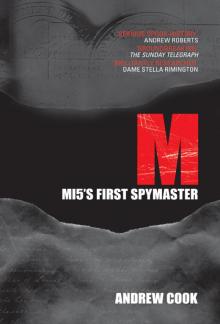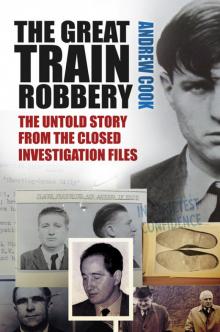- Home
- Andrew Cook
M Page 12
M Read online
Page 12
The late Superintendent Williamson had been fond of telling Melville ‘The four essentials for a policeman are truthfulness, sobriety, punctuality and tremendous care as to what you tell superiors.’41 Melville was tight with information, and as a result, for the first time a senior policeman knew more than the Assistant Chief Constable. He also knew more than his Chief, Littlechild.
SIX
A MAN TO BE TRUSTED
1892 ended in triumph for Melville. His public image was exactly what he wanted it to be: he wanted trouble-makers to know that he would play dirty.
On the other hand, English and foreign anarchist groups felt a new bitterness towards London’s police, and they attracted sympathy among radicals generally. The publisher of Commonweal had lost his wife just four hours before his arrest, and it was said that Melville’s men had dragged him into custody leaving the children alone with the body of their dead mother. Melville himself is supposed to have manipulated the feelings of Madame Delbecque as her baby lay dying. And this from a man who knew what it was to lose a wife and a child. How could he live with himself?
Presumably he managed just fine, because he believed that the end justified the means; and also, that everyone has choices. Mowbray had chosen to publish an incendiary article and Madame Delbecque had chosen to cast in her lot with an enemy of society. They must take the consequences. He drew a sharp line between his sentiments as husband and father and the immediate needs of his job.
Certain Paris newspapers at the end of 1892 read like public relations for the Met.
The word on the street in London is that the anarchists are resolved to revenge themselves for François’ extradition – both on Melville, and on English justice in general. Everyone blames the English and the number of French anarchists in London has doubled… But the anarchists are trailed by police close as sheepdogs. The police miss nothing. English police are also at ports including French ports, and at Anvers in Belgium – always in plain clothes… Melville, who captured François, has seen correspondence between London and Paris anarchists in an as yet impenetrable code.1
What is being set up is a thrilling battle: the sleuth against the forces of evil – and it is no coincidence that this period sees the first success of the detective novel.
The French agents are equally impressed, although momentarily alarmed by a report that Anarchist Central now seems to be London with its driving force in America.2 Agent R in Paris sees an end to London as a haven: he has been told by an informant who is ‘in a high position in anarchist circles in London’ that since the extradition of François, the foreign anarchists no longer feel safe in London and have decided to move to Barcelona.3 This confirms other reports and there is also talk of moving to Geneva, where it might be easier to print anarchist papers. From January of 1893 agent Z describes how the French and other anarchists are extremely nervous – mainly of each other. Barely a week passes but a meeting is held and one of them is accused of being a grass.
To Melville’s satisfaction, the London anarchist community was imploding from within.
Behind the scenes the Russians were trying to sort out extradition treaties. In April of 1893 they were able to announce success in reaching agreements with France and the United States; but the advice to Russia’s envoy to England proved correct. The English stuck to their ‘liberties’ and the Foreign Office and Home Office were unwilling to collaborate. Melville could not assist.
Chief Inspector Littlechild, according to a not-altogether-reliable informant, told his officers to act openly, that is, never to pretend to political sympathies they did not have in order to get information since ‘it was degrading to the service for an official to play the part of a spy’.4 Either overwhelmed by the growing hegemony of Melville’s less honourable tactics, or because he saw a more lucrative future as a private enquiry agent, he retired ‘for reasons of ill health’ on 9 April at the age of forty-five. He took three weeks’ holiday before his official retirement date.
So from Monday 20 March 1893 – ten years to the day since he began work for ‘Dolly’ Williamson in the old office in Whitehall Place – Melville took over as head of Special Branch.
He could look back on his progress to date with some satisfaction. He had begun as a sergeant in a new, under-resourced department. By 1893 Special Branch, for the past two years located in the New Scotland Yard offices, was answerable only to Anderson who reported directly to Home Secretary Asquith. In some ways Melville’s job gave him more power to defend the realm than any English policeman including the Commissioner, and he knew it.
One man who had been with Sergeant Melville as a constable in Williamson’s outfit in 1883 was Patrick McIntyre, who would later get his revenge over the Walsall plot. Now, in the spring of 1893, McIntyre was recovering from his involvement in a curious affair that had arisen last year out of his ramshackle private life and questionable contacts.
An American doctor, a real one this time but again an abortionist, had come to London in the autumn of 1891 and had taken lodgings at Waterloo. And again this was no ordinary doctor, but a murderer; and in the course of the winter and spring of 1892 he led several unsuspecting young prostitutes to a horrid and painful death by the administration of strychnine. At the same time he wrote anonymous letters accusing unlikely strangers and prominent people of having murdered them. The poisoner was being sought, and Dr Neill Cream’s behaviour was suspicious, but there was no proof and he was not arrested; there were many suspects.
In April of 1892 Cream made the acquaintance of a former private detective called John Patrick Haynes, who lived in the Westminster Bridge Road above a photographer’s studio. Haynes was from Philadelphia and now, like Neill Cream himself, appeared to be rather down on his luck. He grew quite friendly with Neill Cream, seeing him most days and going to music halls with him, although he listened with dawning suspicion to his wild talk about the poisoned women and the men who (according to Cream’s alleged inside knowledge) had murdered them.
Haynes confided his doubts to a drinking partner of his, Sergeant Patrick McIntyre. McIntyre encouraged Cream to talk and he too became friendly with him. McIntyre and Haynes drew Cream into a trap. In fact it was thanks to their subtle approach, and to subsequent research in America which showed that Cream had already served time there for murder but had been released insane, that he was arrested. He was hanged in London in November of 1892.5
Despite this bit of resourceful detection Haynes was still out of work and Sergeant McIntyre was still a sergeant when Melville took over. Somehow in the summer of 1893 McIntyre so offended Melville that in September he lost his position in Special Branch. There were plenty of opportunities for detectives to defraud their employers; they could put in false expenses claims or pay non-existent informants, for instance; in McIntyre’s case the stated reason for dismissal was a fraudulent claim for a day not actually worked. But these things never arise out of the blue and there does seem to have been some mistrust between them already. Melville had disciplined McIntyre for insolence before. Also McIntyre allegedly fell out with Le Caron, whom he had been set to guard. McIntyre may have been a fiery and undisciplined, troubled man; he was certainly resentful enough of his sacking to want to cause trouble, two years later, with the articles about Walsall in Reynolds’ Newspaper. But he blamed his dismissal from the Branch on a suspicion among his superiors that he was growing too fond of an anarchist’s daughter. It is a fine romantic tale but perhaps there were other, more mundane reasons.
‘Haynes’, the out of work detective who had befriended Cream in the first place, was none other than John Patrick Hayes, the Irish American who had spied on Fenians for Jenkinson in America and Paris in the mid-1880s and had later been paid to seek support for The Times against Parnell. Hayes certainly knew, and may recently have sought work in London from, Inspector Maurice Moser who was stationed in Paris for Monro from 1884 to 1887. Moser, like Hayes, knew Patrick Casey the British agent; Moser, like Hayes, had worked for The Times on
the Parnell case.6 He was now, in 1893, running his private detective agency out of 2 Southampton Street, Covent Garden, and doing a bit of work among the anarchists for the French Sûreté.7 Moser reported directly, not through Scotland Yard: for instance in this letter to M. Goron, Chef de la Sûreté, Paris, dated 26 April 1893:
Cher Monsieur,
I am sorry that as a result of enquiries made by the London police, Corti has been sacked from his job. He came to see me yesterday and was furious, believing that I had something to do with it.
He didn’t want to reveal any secrets of the Rinard affair, where there was still more to know (encore d’autres marchandises). I offered him money but he vehemently refused.
He tells me that Pavesi has just done something in Belgium and is expected in London on Sunday. He promised to tell me as soon as he arrives.
So far as the anarchists are concerned my informant has just got me a circular (appended) and tells me that at the meeting of Autonomie, 6 Windmill Street, yesterday, it was decided not to send delegates in view of the May 1st demonstration in France; Dr Merlino was in the chair…8
One or two anglicisms indicate that Moser wrote this himself. (Melville, the French agents, grasses, private detectives – no wonder the anarchists were paranoid.) But it does indicate that Moser might need workers, sometimes, in surveillance. At Cream’s trial Hayes (as Haynes) claimed that he had been working against anarchists in 1892. He was not on the payroll of Scotland Yard (who did not trust him)9 although Jenkinson had given him a testimonial. Inspector Moser was one of the few people in London who knew his history and would give him work.
McIntyre knew Hayes but how did they meet? He would surely not have met him in the course of his Irish duty, since McIntyre was in England in the 1880s while Hayes was in America or France. But they had apparently known each other for some years and they both knew Le Caron. It is possible that they both worked for Moser in his snooping duties for Monsieur Goron. Moser was in a position to offer occasional work to detectives. This of course is highly irregular. Even today, policemen have been known to moonlight for private detective agencies. But moonlighting – and we cannot prove it – is a more convincing reason than romance for Melville to have sacked McIntyre, whose police career came to a final and ignominious end as a beat policeman in October 1894. Having sold his story to the papers, he took over a pub in Southwark, and faded from history.
The first half of 1893 passed in truly dreadful confusion among the foreign anarchist community. The archives make nervous reading…Weil got a letter saying that Gardrat is a grass. Gardrat stormed out telling them all to go to hell; a man who defends him is accused of being a nark; Schouppe isn’t going to get any money out of this writer, because if it’s lent he’ll wonder where it comes from; Mathieu has gone to ground – Meunier has probably gone to Argentina – Marocco moves so often that nobody knows where he lives – Jourdin’s come to London probably to shop somebody to the police – Schouppe has been arrested in Brussels but according to the anarchists themselves, the only thing he understands about anarchy is expropriation – he’s just a robber. Parmeggiani and his wife have been in a dreadful brawl outside a pub… A couple of anarchist papers have been burned out; there’s a gang believed to be in the pay of the German police, people think they did it …Nobody will say anything.10
In July agent Y3 reports that the German police chief is said to be snooping in London. He might well have been, for in May, three misguided members of the Autonomie Club, in court in Berlin, had sworn that it was a social club, not a political one, and the prosecution in Berlin asked for confirmation of this from the English Government in order to ‘assist the defence’. As a result the Home Office commissioned a report from Melville. Then they wished they hadn’t.
Its members are composed chiefly of advanced and prominent anarchists and are of all European nationalities, but Germans are in a large majority… the club has been used as a centre for forwarding anarchistic literature to the continent, but more particularly to Germany, and for generally propagating anarchistic doctrines… Funds have frequently been sent from the Autonomie Club to various continental countries for propagating anarchism, and as occasions arise subscriptions are made for fugitives from justice from the continent if their offences are of a socialistic or anarchistic nature. I am informed that the club is affiliated with similar clubs in Germany, Belgium, France, and Italy… from the number of foreign refugees who arrive there, I have no doubt but it is so affiliated. The club may be described as the foyer of foreign anarchism in this country.11
Melville added a postscript saying that the building had recently burned down, while empty. And standing alone, his parting shot: It was heavily insured. Sir Edward Bradford wrote a two-page covering letter to the Home Office before submitting this. Anyone could see that the whole thing was so politically embarrassing that it simply could not be forwarded to the German Government. After a few panicky notes between civil servants a silkily bland reply was decided upon: HM Government regretted that no response could be given, as to do so, in such a way as to bear witness for either side, was not in accordance with HM Government’s practice, and would set a dangerous precedent…12
François, having been found innocent by a French court, was back in London, sitting in pubs drinking absinthe with his friends but keeping a lookout for the comrades who got him busted. There was a meeting at the Autonomie, at which Louise Michel spoke for an hour. Plenty turned up and talked revolt ‘but in private, everyone wanted to go their separate ways; enough of organisation’. People don’t seem to be quite so hard up; Parmeggiani and Cova are selling wine and sausage to Italian suppliers; Coulon is setting up a printing press.
In September, Y3 was in Paris, and writing a report that summed up his feelings quite frankly.
The English press especially the Daily Telegraph and the Morning Post are totally fazed by recent anarchist attacks in Barcelona & Vienna, agitation in London, violent manifesto &c – and have no remedy; they are totally bowled over by it. The Daily Telegraph thinks the police of Europe and the United States should work together against the ‘human wolf’. But the English won’t have it. Have just been discussing this with Mr Ricksmann from the German Embassy here – who controls information coming from London – he says the Daily Telegraph solution is impractical – they do co-operate… but not formally – which would not work. The German anarchists already find life on the continent intolerable. Now that the Marshal Campos affair [assassination attempt] has happened Spanish will chuck anarchists out – America has at last signed a treaty with Russia and will do with France – only the English are outside the pale legally. So it will remain, a free town for such types – because it suits everybody that way. We know them. On the continent we know them. We need a safety valve or it would all be much worse.13
In November there was a stupendous anarchist bomb outrage in Barcelona, with thirty dead and eighty injured; the heat was on. Agent Monte Carlo was in constant touch with Melville, and tipping him off.
Three anarchists have come in from Brussels and one of them, Charles Decord, is dangerous. He’s short, about 1m 52; wears an overcoat trimmed with imitation astrakhan, big collar, round at the back; little bowler, pink tie with blue knot …hitches his trousers up all the time. Used to make bombs with Carriola – has been off the scene – will let you know the train he’ll be on back to Paris. Melville is going to have them all watched.
And three days later:
Melville, chief of Special Branch at Scotland Yard, has been made aware of the robberies at LeVallois and St Ouen. He will take measures to ensure that these people are watched until the moment extradition is granted…
Four days pass and Z6 writes:
The whole Melville squad has been watching the quartier for two days – too late to nab Edouard or Le Breton, but they’ll have to come back when the police presence has died down, they can’t afford to stay away, and then they’ll be picked up. You see police every night at the Club and t
he pub.
Monte Carlo was writing again at the end of the month about various anarchists spotted in the neighbourhood, none of them Spanish:
Some of them are about to rob gold and jewellery &c and some of the proceeds will go to ‘propaganda’… Anarchists will make no headway in London. People are too well off and peaceful. All the same Melville’s men are all over the quartier and the anarchists are very leery, they think there’s something up.14
On 28 November Z6 sent to Paris an (unidentified) issue of The People in which there appeared an interview with Melville and counterbalancing view from a radical MP (probably John Burns). This must have attracted the attention of French editors as well as French policemen, because within days a journalist from Gil Blas was in Goodge Street. Everyone knew which comrade had been talking to this man at the club, who’d been seen with other French journalists – and then in the middle of it all, on the first Sunday of December, the Commonweal people had a meeting in Trafalgar Square, in the course of which the Barcelona bombers were congratulated for their enterprise.15 The police broke it up; another French newspaper reported in awed tones that ‘none of the cops was less than six feet tall’.16 Truth, the paper run by well-off liberal Henry Labouchère, had employed a private detective to look into the Walsall affair and now it printed allegations about how Deakin was fitted up and Coulon escaped. John Burns, the radical member of Parliament, was to ask questions in the House of Commons about this. The agents wrote all about it to Paris: anything about Melville was of interest, it seemed.
What Burns wanted, and never got, was an enquiry. What other MPs wanted was a ban on anarchist publications; they never got that, either – Asquith told them on 7 December that he thought it best to leave things as they were. On 14 December and 19 December there were more questions in the House. What are we doing about 200 anarchists expelled from France, who are coming over here? What are we doing about these people preaching sedition and wreckage? Asquith for the Home Office, and Sir Edward Grey for the Foreign Office, gave bland replies. Some of the French agents were now sending reports twice a day, and were keeping in close touch with Melville, and sometimes reined him in…

 M
M Ace of Spies
Ace of Spies The Great Train Robbery
The Great Train Robbery The Ian Fleming Miscellany
The Ian Fleming Miscellany